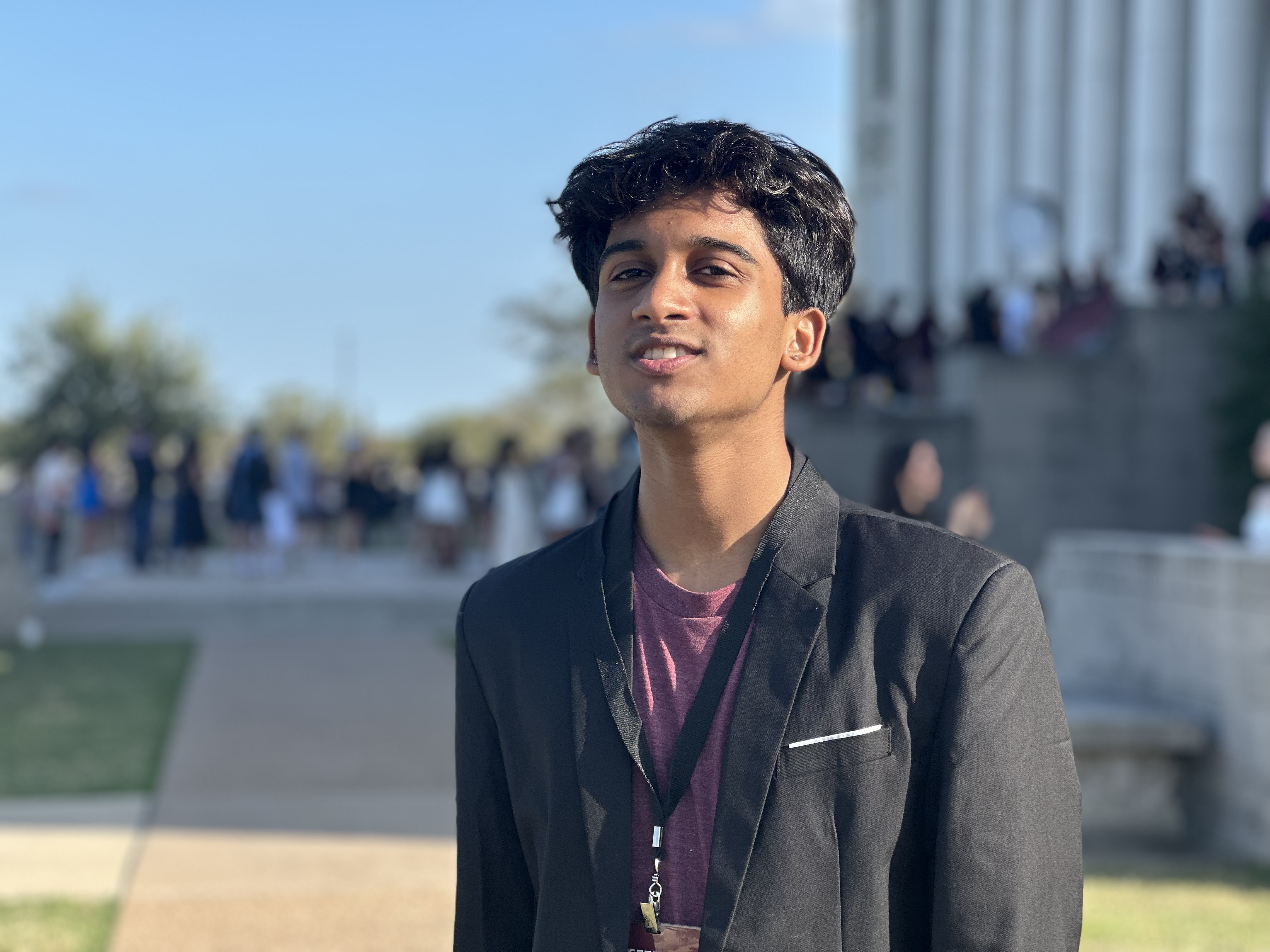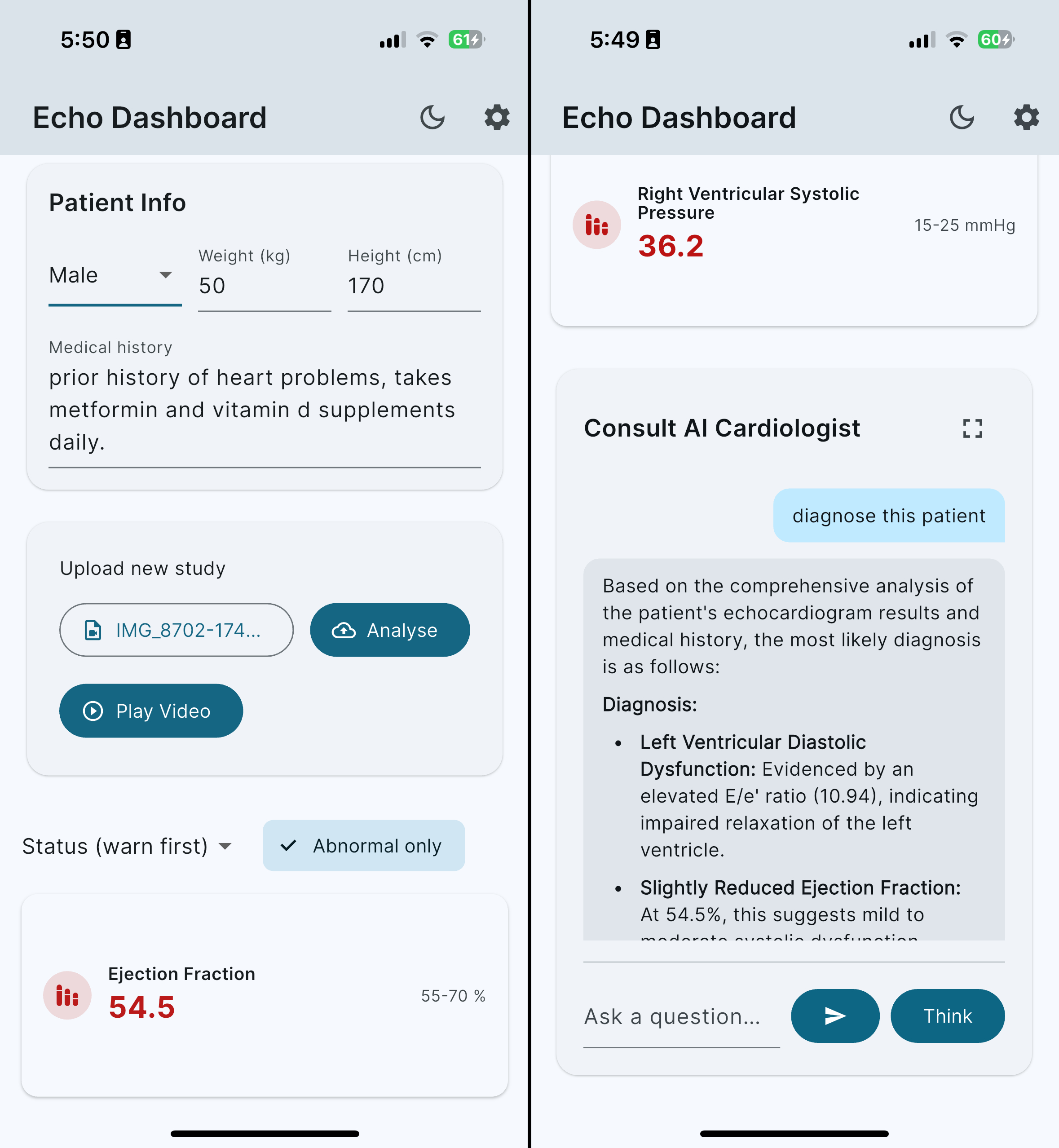Abhirama Sonny
About me
Hi! I am a high school Software Engineer with 5+ years of experience across software development, machine learning, website development, robotics, and architecture development products. I also have experience with full stack web development, and mobile app development. I build projects that solve problems I have, and I love learning new technologies and skills. In my free time, I compete in competitive biology exams, play chess, and practice my typing.

Some of my projects
View all
Multimodal Deep Learning Pipeline for Echocardiographic Biomarker Extraction and Automated Cardiovascular Diagnosis.
Developed a multimodal AI mobile application leveraging Convolutional Vision Transformers (CvT) to autonomously extract critical cardiac metrics from echocardiogram imagery, including ejection fraction, wall motion abnormalities, and valve morphology. Integrated a sophisticated Retrieval-Augmented Generation (RAG) pipeline utilizing FAISS vector search to supply DeepSeek r1 with rich diagnostic context from medical literature. Achieved 93% diagnostic accuracy validated against cardiologist assessments across 2,400+ in depth patient cases. Trained off of a dataset that is 1.8M+ in size. Built with PyTorch, Tensorflow, and FastAPI, designed to support cardiac sonographers in real-time clinical workflows and enhance patient understanding through AI-generated explanations.

Decentralized Dynamic Path Optimization for Autonomous Vehicle Networks
Co-authored a peer-reviewed JISEM paper and patent application proposing a novel peer-to-peer framework for autonomous vehicle (AV) routing that leverages mesh network communication to share real-time telemetry including position, velocity, acceleration vectors, and environmental sensor data. Implemented a distributed consensus algorithm enabling each AV to dynamically optimize its route using data from neighboring vehicles within a 500m radius, preempting potential collisions and reducing urban congestion by an estimated 23%.
Java Neural Network Framework
Designed and implemented a comprehensive neural network framework entirely from scratch in Java, featuring custom matrix operations optimized with SIMD-like parallelization via Java's Fork/Join framework. Supports fully connected layers, convolutional layers, batch normalization, dropout regularization, and multiple activation functions (ReLU, Leaky ReLU, Softmax, Tanh). Implemented backpropagation with automatic differentiation, Adam/SGD optimizers, and Xavier/He weight initialization. Achieved 97.2% accuracy on MNIST with a 3-layer MLP.
Jaithon Programming Language
Designed and implemented a custom programming language merging Java's type structure and performance with Python's syntax and readability. Built a complete toolchain including a recursive descent lexer/parser generating an AST, semantic analyzer with type inference, and a bytecode compiler targeting a custom stack-based virtual machine. Features include static typing with optional type annotations, first-class functions, closures, list comprehensions, and garbage collection via reference counting with cycle detection. Includes a standard library with 50+ built-in functions for I/O, math, and string manipulation.
Experience
FIRST Tech Challenge (FTC) is a robotics competition where high school students design, build, and program robots to compete in games involving challenges like scoring points and navigating obstacles. As a programmer on Team 7172 Technical Difficulties, a 13+ year private team from Plano, Texas, I develop software for robot control in autonomous and teleoperated modes to achieve competitive success.
- Ranked 3rd on the FTC Hall of Fame, MTI '25, and World Championships '25, demonstrating exceptional performance in competitive robotics.
- Developed software for LimeLight 3A utilizing Convolutional Neural Networks (CNNs) to detect game elements, enabling autonomous robot navigation.
- 7x North Texas Winning Alliance Captain, and Worlds Connect Award 1st place '25', leading the team to multiple victories.
VEX Robotics, Team 14142A Axiom
Programmer - Team 14142A Axiom
Co-founded a private highschool VEX v5 robotics team, Team 14142A Axiom from the organization IrrationalRobotics. VEX Robotics is a competition where high school students design, build, and program robots to compete in games involving challenges like scoring points and navigating obstacles. As the lead programmer, I developed the robot's control software using Pros CLI in C++.
- Designed a modular state-machine control framework, reducing subsystem integration time and improving reliability during matches.
- Wrote a custom pure pursuit path-following algorithm for differential drivetrain robots with adaptive lookahead and curvature-based feedforward, achieving median path tracking error < 2cm in tests.
- Built a cross-platform path-planning and waypoint editor that exports trajectories to the robot and to a simulator for closed-loop verification; included velocity profiling and obstacle heuristics for real-world robustness.
Contextra AI
CEO & Founder - www.contextra.org
Building a startup that adds an AI agent to your iMessage group chats. Core functionality includes web integration with online vendors to facilitate easy ordering, smart scheduling with Google Calendar, and smart summaries, among other features. Used Heroku, OpenRouter, and PostgreSQL.
- Developed an agent for iMessage groups, enabling seamless integration with external APIs for real-time data retrieval and user interactions.
- Implemented custom web scraping & web interactions with vendors to automate product ordering, reducing manual effort and improving user convenience in group chats.
- Integrated Google Calendar API for intelligent event scheduling, allowing the AI to propose and book meetings based on group availability.
Wetlab Research on endophytes under the guidance of Dr. S. Umesha, Department of Biotechnology. Worked on the preparation of Nutrient Agar, Potato Dextrose Agar, and isolating endophytes from plants.
- Isolated viable endophytic fungi from healthy leaves of Ocimum sanctum and Leucas aspera using surface sterilization and plating on Potato Dextrose Agar, documenting reproducible colony emergence within five days.
- Identified and characterized nine distinct morphotypes based on macroscopic morphologies and growth behavior, consistent with genera such as Aspergillus, Cladosporium, Fusarium, and Diaporthe/Phomopsis, while recording host incidences.
- Prepared clean subcultures for downstream molecular identification and bioactivity screening, establishing a sterile workflow that aligns with published research on endophyte diversity in Lamiaceae herbs.
Cambridge Centre for International Research
Student Researcher
Conducted advanced research on cell signatures in autoimmune conditions, focusing on Myocarditis, under the mentorship of Dr. Jodi Kraus at the Cambridge Centre for International Research. The project involved developing and testing methodologies to differentiate myocarditis-affected cells from healthy controls, utilizing wet-lab & computation techniques to enhance diagnostic accuracy.
- Developed a novel assay for identifying myocarditis-specific cell signatures, achieving approximately 95% accuracy in distinguishing affected cells from controls.
- Collaborated on data interpretation and statistical modeling to correlate cellular biomarkers with disease progression, contributing to potential advancements in autoimmune diagnostics.
Honors & Awards
USMDO Silver Rank
Achieved Silver rank nationally on the US Medicine & Disease Olympiad. This exam tested my knowledge of human anatomy, physiology, pathology, and medical terminology. I achived a score of 149/160, placing me in the top 6% of participants.
Texas Science & Engineering Fair (TXSEF) Finalist
Advanced to the Texas Science & Engineering Fair (TXSEF) for my project on "Multimodal Deep Learning Pipeline for Echocardiographic Biomarker Extraction and Automated Cardiovascular Diagnosis."
USABO Semifinalist, Honorable Mention, Rank 4th Nationally
I was recognized as a Semifinalist and received an Honorable Mention in the USA Biology Olympiad (USABO), achieving a national rank of 4th place on the opens exam (evaulated via the histogram). This exam tested my understanding of plant, animal, and cellular biology, genetics, ecology, and cellular processes.